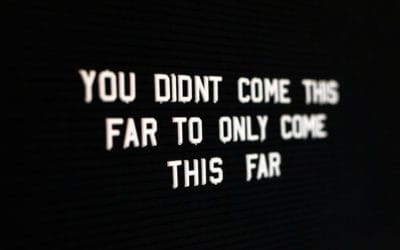Recently, I was in a meeting with someone who told me that I talk too much about the RE aspect of FIRE (Financial Independence Retire Early). I was stunned. Why? Because this was in reference to some of my trainees, and I have spoken clearly about how I don’t think FIRE is a good thing to teach medical students or residents. Instead, I spend quite a lot of time talking about financial independence. Despite my talk on financial independence, I don’t plan on joining the Drop Out Club anytime soon.
The “Drop Out Club”? Yep. That’s a real thing. There are doctors fleeing medicine in droves, becuase it isn’t what they expected it to be. Since I talk so much about financial independence, do I plan on leaving medicine as soon as I can?
Let me state this unequivcally. No, I don’t plan on leaving medicine as soon as I can. I love practicing medicine.
I write about financial freedom to help other doctors practice because they want to practice. Not because they have to due to financial stress. Why? Because I believe financially independent physicians – and those on their way to getting there – are better doctors.
I’m All In On Teaching Finance and On Practicing Medicine
For every 1 complaint I get about being too vocal about personal finance, I get about 100 questions from students, residents, and other faculty/staff about money.
It is clear that people are very interested in learning more about money from someone they trust.
Due to the fact that people now know about The Physicain Philosopher blog and my upcoming personal finance curriculum at Wake Forest, I never have to bring up money. It happens naturally about 5-10 times per day without me ever mentioning a word about personal finance, financial independence, or whether you should use your non-governmental 457 or not.
In fact, I had about 20 of our office staff recently ask me to lead a “lunch and learn” so that they could learn about saving for retirement, too.
Still, with all my talk about using financial independence as a tool to combat burnout, I think people miss one major point. I love practicing medicine, and plan to continue practicing anesthesiology long after I am financially independent. I’m not joining the drop out club anytime soon.
Here are several reasons that I plan to keep working after I reach financial independence.
1. I Love Practicing Medicine
In my job as a regional anesthesiologist, I get to put together puzzles and play video games. Every. Single. Day.
These puzzles and video games help patients in a very real way.
The puzzles are a combination of my patients’ comorbidities, their planned surgical procedure, and other mitigating factors. Given the information I have, I get to decide which procedure and local anesthetic mixture is most appropriate to get this specific patient through that specific case.
It’s basically like a life sized sudoku puzzle!
And when we put the pieces together, I often get to hold what looks like a video game controller in one hand and a needle in the other. Then, I get to watch an ultrasound screen as I direct a needle to the exact location it needs to be placed to numb the patient up for their procedure.
Like I said, I get to put together puzzles and play video games at work. Two things I loved growing up, and still have an affinity for today.
Would you believe that I get paid handsomely to do all of this, too? This keeps the need to join the drop out club out of sight, for now.
2. Teaching Gets Me Up in the Morning
It is my firm conviction that our medical students and residents are intelligent, educated, and resourceful. My job isn’t to teach them facts. It is to teach them how to think. If they want to know the “what” behind something, they can pull out a text book, or their cell phone.
From regional anesthesia to the 20% of personal finance they need to know, these same principles are applicable.
And, when it comes to teaching, there is nothing quite like watching a “light bulb” moment in a learner. It never gets old to me. Particularly when it is something that is a tough subject or that they have previously tried to learn, but couldn’t grasp.
What I enjoy even more is watching a resident get to the conclusion on their own. 99% of the time that I am asked a question, I answer it with a question (the socratic method is hard to shake for an old philosophy major).
Teaching is what gets me out of bed in the morning, and what helps me avoid the drop out club.
3. Finding Answers is Fun (when there is support)
There are three pillars in academic medicine: clincial work, teaching, and research. Long ago, I decided that I wanted to be one of the few that is good at all three pillars. Some people call this a “triple threat”.
I’d be lying if I said that I am just as enamored with the idea of clinical research as when I started as a senior resident, but that just isn’t the case. Now that I’ve seen many of the warts and blemishes that research has to offer, I love it for what it is – asking a question, and getting an answer (if your study is designed well).
This is probably the area of my job that I have applied my Hell Yes Policy the most. If a specific question is not something I am crazy passionate about, then I am not really interested in leading the project.
I’ve said no to quite a few projects in the last year.
Yet, I’ve also said yes to some really cool research projects, like our upcoming paper on student loan financial literacy in our residents at Wake. The world of educational research in medicine is ripe for the picking. Particularly as it pertains to personal finance and practice management topics.
The idea of studying education and financial topics in medicine… well, that gets me excited. That’s where real change can start to happen, which might change the way our medical schools prepare our future physicians to obtain financial wellness (and avoid the financial stress that many of us have experienced).
4. I Love a Good Fight
It is no secret that I think the culture of medicine is in bad shape. From administrators who don’t know how to eat last to victim-blaming campaigns that pin all of the burnout epidemics on the doctor (“resilience” training anyone?), the examples are too many to count.
I am a big believer in cultures that allow for anyone to speak up with a concern without fear of retribution. It is what good safety cultures are built on, which saves lives in the operating room. This culture stems from the aviation industry, which was a thought leader in this space after planes kept crashing and killing hundreds of people.
Yet, this culture is completely lacking when it comes to most departmental and hospital leadership. The people involved aren’t bad doctors, family members, or people. They just don’t know how to go about creating a culture like this in medicine, which has a long and storied history of being hierarchical and based on tradition.
One of the reasons that I won’t be joining the drop out club is the fight to change our culture is worth staying. While our doctors are strong, and this system must be changed, it will require a group of doctors who are willing to help change it.
5. Anesthesiology Can Be Scaled Back
One of the aspects of my job that I love, and will allow me to practice long after I reach financial independence, is that it can be scaled back. I am fortunate that I work in a specialty that allows this. In fact, I’ve already started to cut back slightly so that I can prolong both my career and my career satisfaction.
Why would I do something like that? Because part-time work can save careers.
I have seen time and again people who once loved medicine. Then, they lose that loving feeling when hospitals didn’t love them back. Yet, they fall back in love with their job once they work less. It is all about balance, and that looks different for all of us. For me, it looks like working 3 or 4 days per week on my non-call weeks.
So, as long as they will have me, I will continue to play video games. I’ll keep teaching our future doctors. Finding answers to tough questions will remain fun. And I’ll keep fighting the good fight, even if it requires me to be a bulldog along the way.
Have you thought about quitting medicine? Why do you stay? Have you considered joining the drop out club? Will you hang around after you reach financial independence?
TPP





I do feel like I will be part of the drop out club unless things drastically change in medicine (which unfortunately I don’t think will happen and even worse likely get even more painful.)
Even though radiology is similarly scalable it is getting to the point that when you are working you feel like you are in a post office dealing with more things to do for less pay as time goes on.
Teaching is enjoyable and I did have fun doing that when I was in academics. But where I live there really is no convenient academic facilities to transition to if I did wish to go back to that.
Yeah, it’s hard not to have a fatalistic mentality towards medicine right now. It is such a big machine with so many moving parts, it is hard to see this thing changing.
I gave a financial talk to 8 PGY3s recently and I was impressed they had all heard of FIRE. Maybe word is getting out!
None of them wanted to RE, but FI in 15 is a great goal!
I wonder, since they are new to medicine and don’t have quite the conception of “the good ol days,” if their views won’t change when they hit attending levels of burnout rather than resident burnout.
Personally I’ll drop out when I can find a more fulfilling way to spend my time. Being FI, you can cut out most of what you find annoying about the job. If I could cut the administrators completely out, I might stick around for a while…
FI in 14 years is a great goal. I agree. And even the path to FI provides great power and opportunity.
FI for all.
RE for a select few.
RE makes sense for some, but not for me.
FI should be a goal for all.
That way all will have options and not feel trapped.
Completely agreed.
This. This. THIS!!! I love hearing another physician financial blogger talk about FI and not RE! It seems like the FB groups spend a lot of time focusing on RE. I can’t imagine giving up medicine, for a lot of the same reasons as you. Thanks for standing up for the profession that I love so much!
-Brent
http://www.TheScopeOfPractice.com
the video games at work never get old 🙂
Didn’t realize you thought of anesthesia that way and I like the Sodoku analogy.
Thanks for hitting a lot of the positive aspects of medicine here. It’s refreshing.
Thanks! I have a lot of fun at work most days 🙂
And, I agree, there isn’t enough discussion about the positive aspects of medicine. Trying to turn a leaf!
TPP
It’s a gift to be able to practice medicine and impact people the way we get to on a regular basis. I’m all in on the FI, but the RE has never been the point for me.
I have great empathy for those who feel that it is, as it wasn’t probably the reason they got into medicine in the first place. Hope they can find some joy and comfort in realizing the impact you make on others is significant.
Falling back in love with medicine proves challenging when the burnout and moral injury are at all time peaks.
This is why I am big proponent of FI, which provides options to go part-time or to rid yourself of the aspects of your job that you hate. That helps many people fall back in love with the job in a brand new way.
TPP
To me, the biggest argument against RE is that patients need someone honest and smart on their side. Yes, the environment in Medicine is now horrible. If it is horrible for Doctors, imagine what it is like to be a patient. Everyone you meet in the healthcare system is out for your money. Some in the system care about you but aren’t smart enough to help you, and some are smart but don’t care enough to help you. To be smart and caring then retire early is a desertion, in my mind.
Sherif, I agree that this impacts patients, too. It is sad.
We need that smart honesty going towards fixing this problem, too. And we cannot do that if we leave
Scaling down is the key to salvaging a career. I have been part-time for the past 18 months and have time to breath and think has made all the difference. Dropping out sounds sexy but only for a small minority. Most of my peers who have achieved FI want to practice till they die or become disabled. I applaud you for sticking with it. Now that I work 75%, I can probably go the distance, plus the company pays for most of my SE tax and health insurance. Worse case scenario scale further down as need or scale up if a financial crisis happens…. more options, more chioces.
Thanks, DOAT. And I agree. It is all about balance and moderation. All or nothing of many things is bad… The middle road is often the answer.
From what I have seen in my patients, Retire Early often leads to Die Early, unfortunately. Also, when I think of retiring, I want to retire from worrying and not from working. Worrying can get worse after retiring. Hence, I do not want No Work, but freedom about how to work and when to work. I believe we can find some of that freedom within our profession perhaps in a different setting. Overwork is bad but no work is worse. The answer is somewhere in the middle. Find it. I found it in 30 hours a week in the clinic instead of 80 hours a week in the hospital. You may find it somewhere else. A quote from Darwin has provided me with the necessary inspiration: “It is not the strongest nor the most intelligent that survives but the most adaptable to change.” Blessings.
hi, stumbled upon your text while reading on the DOC…From my perspective, medicine is such a large field that people will have completely different perspectives about the medical profession. I know that the grass is always greener on the other side of the fence, but I really think anesthesiology will take a lesser toll on you when compared to other areas, especially on the surgical domain. At least over here in Brazil, the cost/benefit ratio for surgeons is awful. I do not envision quitting medicine as well, but I’d certainly love to be able to practice medicine without needing the income from it to support myself and my family. Thanks for the open forum! Cheers